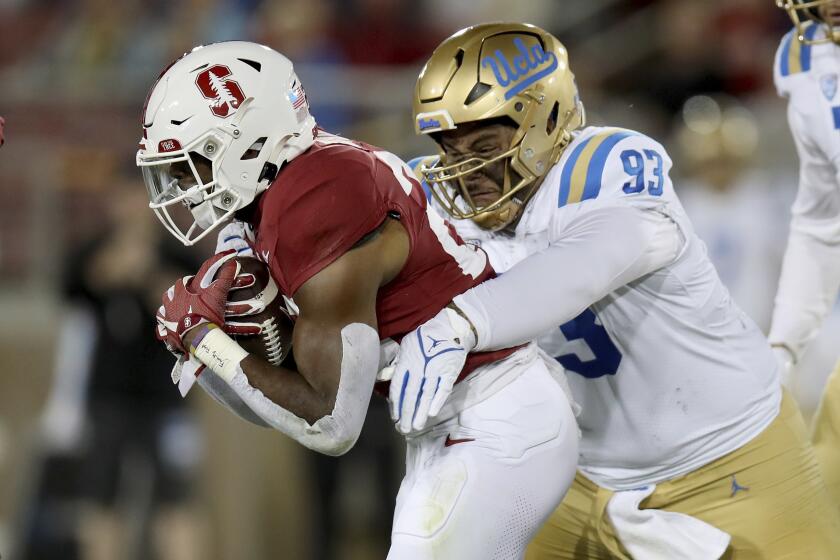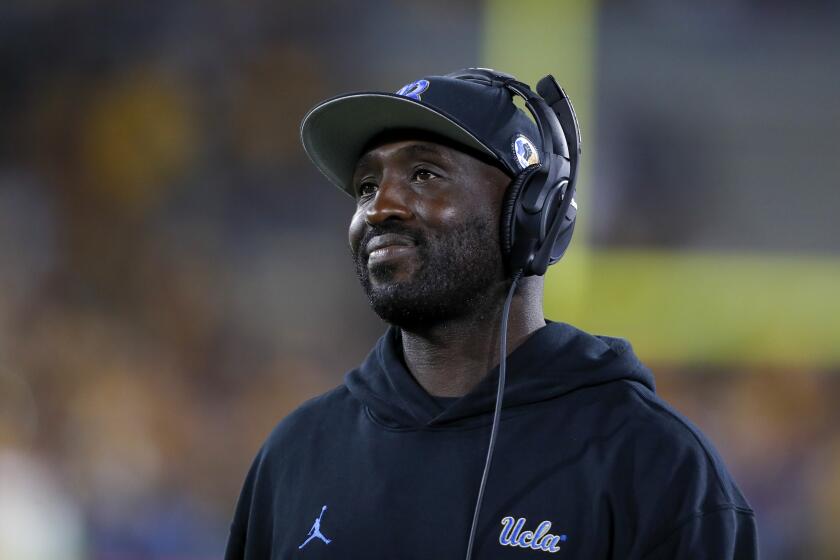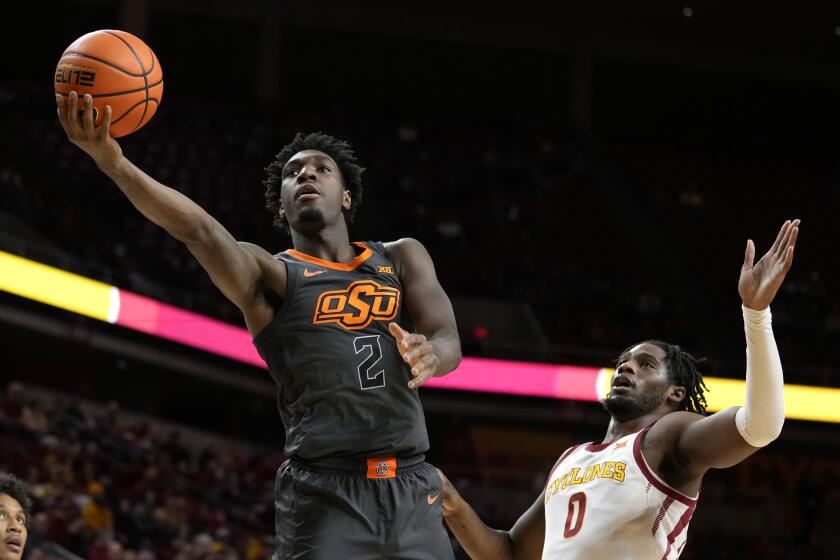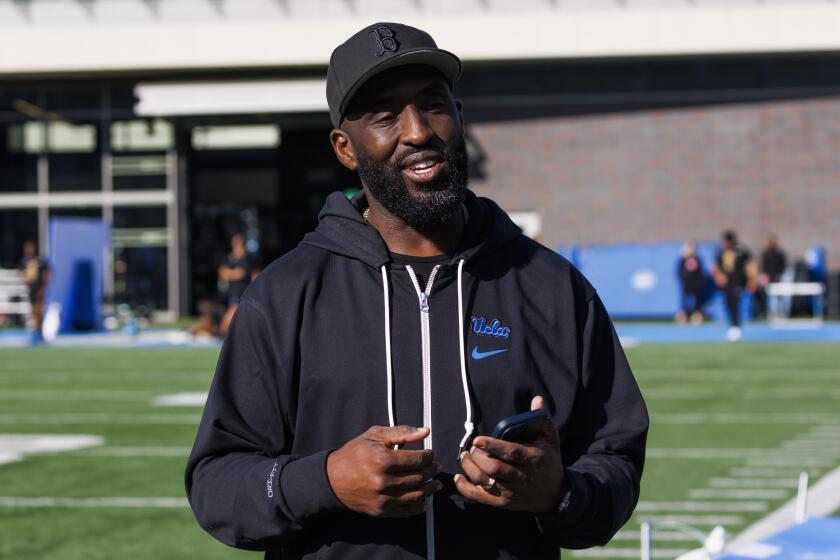He always has Paris
Paris Hundley is protective, very protective, when it comes to her brother, UCLA quarterback Brett Hundley.
“I know he looks like a big and bad football player, but my brother, he’s like a cute baby,” says Paris, who at 21 is a year older.
When they were kids, Paris handled life’s hardships with a don’t-tread-on-him motto. For example, she recalls finding young Brett angry and near tears at a skating rink.
“His fists were in a ball and he was upset,” Hundley said. “A girl had hit him. Brett could never hit a girl. I could. I said, ‘Who hit you?’ It was all over after that. I was kicked out of the rink ... for life.”
Reminded of the incident, Brett laughs and says, “Paris talks too much sometimes.”
He also says of Paris, “She’s my foundation.”
Whatever struggles Hundley endures on the field, he knows it is nothing compared with what his sister goes through daily.
Paris was diagnosed with epilepsy when she was 11. Violent seizures have left her with a separated right shoulder 130 times. Her left shoulder has been separated 70 times. The Hundleys spent her 19th and 20th birthdays at the hospital.
Yet, she never backs away from a challenge.
“The way she is and how she goes about things is big for me,” Brett says. “Knowing she can go through all that grounds me. It helps me understand where I’m at and be happy with it all.”
Epilepsy affects about 2.2 million people in the United States, according to the Epilepsy Foundation. The neurological disorder was brought into the sports pages in recent years with Minnesota football Coach Jerry Kill suffering seizures at several games.
Kill quickly returned to work after each episode until he finally took medical leave this season. Even then, he attended games and received credit from his players for inspiring them.
“That allowed people to see that it does not inhibit you from doing things,” Brett says. “The more light that is put on it, the more people understand.”
Which is why Brett wants the lights on Paris.
::
Brett rarely talked as a small child. “If someone asked me a question,” he recalls, “Paris would answer.”
And if someone were to hassle him, he adds, his sister had an answer for that too: “Paris would step in and bulldoze everybody.”
Paris confirms as much.
“Sometimes he was scared to tell me what happened because he knew I was always willing to fight for him,” she says. “There were a couple boys messing with him and our little cousin in the park one day. Forget that.”
The two gravitated to sports. Both ran for the Arizona Cheetahs, a youth track team. Paris even played one season of flag football with her brother. “They would give me the ball and I’d really run,” she says.
Tackle football was different. Paris became a cheerleader.
“They told me, ‘No, you can’t play football,’ yet there ended up being a girl on his tackle football team,” Paris says. “I was so mad.”
She channeled her energy into track instead. She excelled as a sprinter, especially the 200 meters and the 400 relay. At 11, she helped the Cheetahs finish fourth in a national competition.
Her competitiveness even exceeded her brother’s athletic will.
Their father, Brett Hundley Sr., recalls that when the family would go on bicycle rides, “Paris had it in her mind not to let her brother in front of her.”
Asked who was the better athlete, Hundley Sr. doesn’t hesitate. “Brett is a great athlete, but Paris was the best athlete in this home,” he says. “She was very dominant. I think that’s why he has a hard time when the seizures happen.”
The first one came when Paris was 10.
“We were getting ready to go somewhere and I saw her go into a seizure on her bed,” Brett remembers. “You don’t really know too much about life at that age. I don’t think I comprehended anything until I was a junior in high school.”
Even now it’s hard.
“Brett can’t be in the same room and see that happen,” Hundley Sr. says. “I remember him punching a hole in a door when he was a senior.”
Says Brett: “As a child, you see something like that, you understand life is not always about happy times.”
::
Brett, now a sophomore in college, is building toward a highly successful career at UCLA. The Bruins have won nine games for a second consecutive season, with a chance for a 10th victory when they play Virginia Tech in the Hyundai Sun Bowl on Tuesday.
Many of the school’s quarterback records are within reach, and he could be in the Heisman Trophy discussion and push UCLA even higher next season.
That’s provided, of course, that Brett does not declare for the next NFL draft. Helping Paris and others with epilepsy is in his “turn pro” column.
“I can have a platform, maybe start my own foundation,” Brett says. “There are things I want to do for my family and my sister.”
He has already started.
Brett took a beating in helping UCLA to a win over Washington in November. Yet two days later he was back at the Rose Bowl with Paris and their mother, April, to participate in the Epilepsy Foundation of Greater Los Angeles’ “Walk to End Epilepsy.”
“My body was still hurting,” Brett says. “It was impossible to do the walk. But being there to support her was important.”
They may be miles apart, but brother and sister are tethered by technology. “She texts me nonstop, starting in the morning,” Brett says.
Those messages are a lifeline. There are times when hyperbole swirls around him. He was referred to as “the savior” by Bruins fans before he even enrolled at UCLA.
Paris is there to whisper in his ear, via the cellphone. “Her thing is to make sure I stay who I am,” Brett says. “The first text she said, ‘No matter what fame you get, make sure you give credit to the man upstairs and know that it is all for a reason.’ ”
Brett chooses to believe that. He has watched his sister endure pain and then more pain. After undergoing surgery to repair damage that seizures had inflicted in her right shoulder, she had another seizure the next morning.
The stories out of Minnesota about Kill caught her eye and inspire her. “He’s not letting it stop him,” Paris says.
Paris takes medication to help control the seizures and she has plans to continue her education.
“I always wanted to be a doctor or work as a nurse,” she says. “But a side effect of the medication makes my hands shake.
“That wouldn’t be too nice if I was doing an IV. I’m really good with kids, so maybe teaching.”
Her focus for now, though, is a labor of love.
Paris reads every story about her brother. She checks comments on fan websites. She grins and bears it -- barely sometimes -- if she hears him criticized during games.
“Paris knows that Brett is playing for her,” Hundley Sr. says. “So at games she’ll hear people say things about Brett’s play and she is ready to jump. I have to tell her, ‘It’s OK. That’s part of football.’ ”
Except it’s not just about football. It’s about her brother.
--
Twitter: @cfosterlatimes
Go beyond the scoreboard
Get the latest on L.A.'s teams in the daily Sports Report newsletter.
You may occasionally receive promotional content from the Los Angeles Times.




